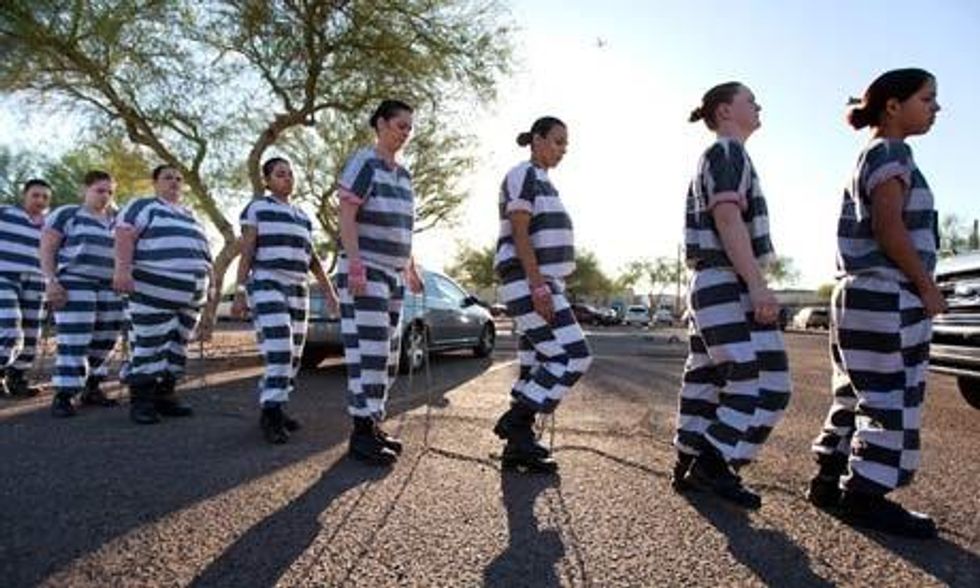In 1979, Congress created the Prison Industry Enhancement Certification Program (known as PIE; pdf) to establish employment opportunities for inmates "that approximate private sector work opportunities". On the surface, the program is a great idea. It gives prisoners something to do, allows them to contribute to their own upkeep and, hopefully, gives them a better shot of getting an actual living wage job upon release. Such was the intention, anyway.
Unfortunately, and perhaps unsurprisingly, this is not how the PIE program has worked out. Instead, it has become little more than a tidy profit-making scheme for corporations and other entities willing to exploit the captive labor force - often at the expense of private sector jobs.
The worst abuses of the PIE program occur in the agricultural sector, particularly in states where draconian immigration laws have led to labor shortages that have left crops rotting in fields. Rather than have to pay real-world wages, farmers turned to lawmakers to help, who, in turn, were only too happy to offer up their prisoners as a cheap alternative. In Arizona, for instance, a state law requires that all able-bodied inmates must work. Prisoners who do jobs within the institution can expect to be paid between 10 cents and 50 cents an hour, but those lucky enough to get a job working for one of Arizona's Department of Corrections (ADC)'s private partners can expect to be paid a whopping fee of "more than 50 cents an hour".
Not exactly what you would call an "employment opportunity that approximates private sector work opportunities". And the prisoners assigned these jobs do not count themselves as lucky.
In a recent expose by Truthout, a female prisoner at Arizona's state prison Perryville unit described her day working as a laborer for a private company called Martori Farms.
"They wake us up between 2.30 and 3am and kick us out of our housing unit by 3.30am. We get fed at 4am. Our work supervisors show up between 5am and 8am. Then it's an hour to a one-and-a-half-hour drive to the job site. Then we work eight hours, regardless of conditions ... We work in the fields hoeing weeds and thinning plants ...
"Currently, we are forced to work in the blazing sun for eight hours. We run out of water several times a day. We ran out of sunscreen several times a week. They don't check medical backgrounds or ages before they pull women for these jobs. Many of us cannot do it! If we stop working and sit on the bus or even just take an unauthorized break, we get a major ticket which takes away our 'good time'."
According to Joseph Oddo, Martori Farms' human resource director, they have gone back to using the guest worker program this season, as they found that the prisons are not always able to provide workers on call the way they need. Responding to the prisoner's account of her experience to Truthout, Oddo said that, unlike their immigrant workers, the prison-provided teams had "adjustment issues" to the early starts, heat and hard physical work: some of them, he said, simply "weren't capable of it". He claims that Martori did provide enough water but that the inexperienced crews did not know how to sip it slowly.
Oddo maintains that the prison work program is a voluntary one that provides "inmates an opportunity to increase their skills, improves their chances of getting work upon release, puts some money in their pockets and is a resume enhancer". The teams were supervised by a correctional officer and a Farms foreman; if a prisoner wanted to opt out, he added, Martori would let them go - and if there were consequences for a prisoner, "That's an issue for the prison system," he said, "it's not our issue or intent." Oddo did, however, acknowledge that as it is mandatory in Arizona for prisoners to perform some kind of labor, the voluntary component (if adhered to by prison officials) relates only to where, and not if, they work.
Martori Farms just happens to be one of the leading suppliers of agricultural produce to that beacon of corporate responsibility known as Walmart. Private companies and corporations have always found ways to exploit prison labor, but this tidy set-up, and the hypocrisy around it, is beyond the pale.
In a press release on the Walmart Website, Ron McCormick, vice-president for produce, says of the company's links with Martori:
"Our relationship with Martori Farms is an excellent example of the kind of collaboration we strive for with our suppliers."
On another part of the Walmart website, the company unambiguously declares (pdf):
"Forced or prison labor will not be tolerated by Walmart."
The disturbing part about all of this is that the 1979 law actually put in place safeguards to prevent the abuse of prisoners' labor. It set forth nine mandatory criteria that would ensure that companies don't get an unfair advantage over competitors, that private sector jobs are not compromised, that prisoners are paid the going rate for their work and so on. The National Correctional Industries Organization (NCIA) was contracted by the Bureau of Justice in 1995 to help ensure that all participants in the PIE program comply with these criteria.
I asked an NCIA spokesperson, Wil Helsop, how Martori Farms and other private companies can get away with what could reasonably be described as forced labor. He explained that the PIE program classifies certain work functions as a "service" rather than an actual "job", and therefore is not subject to the criteria. Conveniently, then, the backbreaking work of picking crops in the blistering sun counts as a "service", so prisoners can be paid even less than the immigrants who have traditionally performed this work.
This loophole identification was brought to you, in part, by the American Legislative Exchange Council (Alec), which introduced an expansion of the Prison Industries Act back in 1995, and which have been lobbying since the mid 1990s to "improve and expand federal prison industries". Alec is the same group that brought us "truth in sentencing" laws that have helped ensure our prisons are packed to overflowing. They also had a hand in the drafting of SB1070, Arizona's immigration law. As Bob Sloan, an expert in prison labor issues, put it:
"Alec has proven expertly capable of devising endless ways to help private corporations benefit from the country's massive prison population."
For companies that balk at the notion of paying workers a living wage, having a cheap and expansive labor force at their beck and call is a win-win situation. For everyone else - the prisoners themselves and the taxpayers who are subsidizing this scheme at the expense of their own jobs and wages - it's a double loss.




